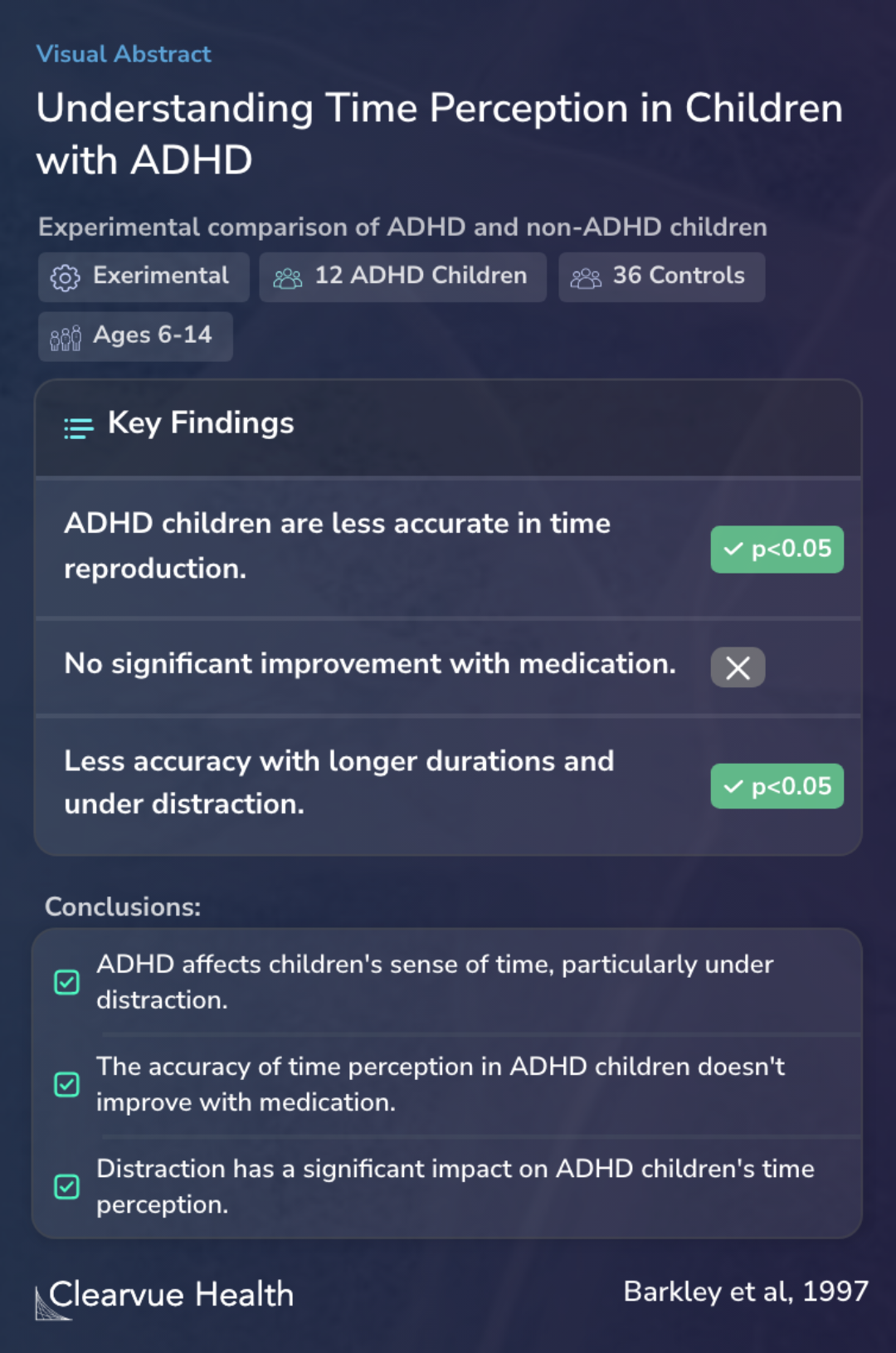Sense of time in children with ADHD: effects of duration, distraction, and stimulant medication
Understanding Time Perception in Children with ADHD
R A Barkley, S Koplowitz, T Anderson, M B McMurray

Objectives
This study looks at a new idea about ADHD (Attention-Deficit/Hyperactivity Disorder). It suggests that kids with ADHD might have trouble understanding time. Two research projects were done to see if this is true. They checked how kids with ADHD and kids without ADHD can tell how much time has passed. The studies also looked at how different things, like the length of time, distractions, and ADHD medicine, affect this ability.
A recent theory of ADHD predicts a deficiency in sense of time in the disorder. Two studies were conducted to test this prediction, and to evaluate the effects of interval duration, distraction, and stimulant medication on the reproductions of temporal durations in children with ADHD.
Methods
The first study compared 12 kids with ADHD to 26 kids without it. These kids were between 6 and 14 years old. They had to guess how long 12, 24, 36, 48, and 60 seconds were. Sometimes, there were distractions during this test. The aim was to see if kids with ADHD and without it guessed time differently, especially when distracted.
Study I: 12 ADHD children and 26 controls (ages 6-14 years) were tested using a time reproduction task in which subjects had to reproduce intervals of 12, 24, 36, 48, and 60 s. Four trials at each duration were presented with a distraction occurring on half of these trials. Control subje...
Results
What they found was interesting. In the first study, kids without ADHD were better at guessing time, especially when not distracted. Kids with ADHD were less accurate, especially when they were distracted. For both groups, it was harder to guess longer times correctly.
The second study focused on ADHD medicine. The same 12 ADHD kids were tested with different amounts of a medicine called methylphenidate (MPH) and a placebo (a medicine with no effect). This was to see if the medicine helps them guess time better, especially when there are distractions.
In the second study, they found that the ADHD medicine didn't really help the kids with ADHD guess time better. These kids still had trouble with longer times and when distracted, even with the medicine.
Control subjects were significantly more accurate than ADHD children at most durations and were unaffected by the distraction. ADHD children, in contrast, were significantly less accurate when distracted. Both groups became less accurate with increasing durations to be reproduced. Tested...
Conclusions
These studies suggest that kids with ADHD may really have a hard time understanding time. The medicine for ADHD didn't seem to help them much with this problem. This is important because it shows that even with medicine, kids with ADHD might still struggle with understanding time. The studies also show that distractions make it even harder for them.
Other research adds more information. For example, studies show that ADHD affects how kids think and feel, not just how they understand time. Brain scans from other studies show that the brains of kids with ADHD are different in many ways. This includes parts of the brain that help with focusing, remembering, and seeing. All these studies together help us understand ADHD better.
The results of these preliminary studies seem to support the prediction that sense of time is impaired in children with ADHD. The capacity to accurately reproduce time intervals in ADHD children does not seem to improve with administration of stimulant medication.
Context
This paper talks about how kids with ADHD experience the world differently. One study showed that ADHD changes how kids think and feel. It affects things like how fast they react and how they control their emotions. This is similar to the current study, which shows that ADHD also affects how kids understand time.
There's also research that looks at the brains of kids with ADHD using special brain scans. This research found that ADHD affects different parts of the brain. These parts are important for focusing, remembering, and seeing. This supports the idea from the current study that ADHD affects many different things, including understanding time.
In short, this study about understanding time in kids with ADHD fits with other research. It helps us see the many ways ADHD can affect kids.